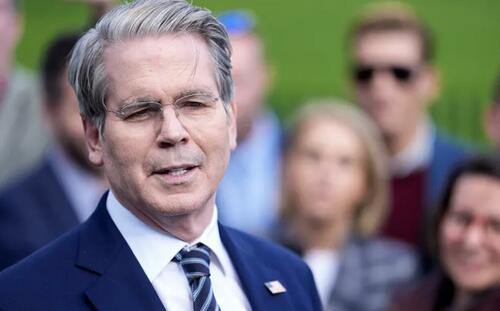Bessent: China “Made A Real Mistake” By Threatening To Curb Rare Earth Exports
US Treasury secretary Scott Bessent says Beijing “made a real mistake” by threatening to curb rare earth exports, according to a new report from Financial Times.
Bessent told Financial Times in a new interview that the US will secure alternative supplies within “12 to 24 months” and also said of China’s threat: “China has alerted everyone to the danger. They’ve made a real mistake. It’s one thing to put the gun on the table. It’s another thing to fire shots in the air.”
Bessent spoke after Donald Trump and Xi Jinping met in South Korea, saying the two leaders had found an “equilibrium” in their trade relationship. Despite recent disruptions triggered by China’s rare earths controls, he believes Beijing can no longer use these minerals as leverage: “I don’t think they’re able to do it now because we have offsetting measures.”
FT writes that the summit followed months of heightened tariffs and retaliatory export restrictions. According to Bessent, Chinese officials were “slightly alarmed by the global backlash” to their latest measures. He said his talks with vice-premier He Lifeng helped preserve a one-year truce: “ceteris paribus, we have reached an equilibrium”.
Bessent described a respectful and pragmatic tone between Trump and Xi, including a lighter exchange about the timing of a potential Beijing visit: “‘It’s very cold in January and February, why don’t we push it back to April?’”
Under the agreement, China will delay its rare earth policy, boost US soybean purchases and permit US control of TikTok. On TikTok, Bessent said: “Everything’s ironed out … we should see a transaction very soon.” The US will postpone blacklisting thousands of Chinese entities, while Trump will cut some fentanyl-related tariffs in return for a crackdown on precursor chemicals. “Fentanyl occupied a lot of the discussion,” he noted.
Bessent rejected the idea that Washington can no longer push for structural reform in China. He argued that US tariffs have diverted Chinese exports to other developed markets: “We’ve set a standard, and I wouldn’t be surprised if the rest of the world doesn’t follow.”
Highlighting US advantages — from “the world’s premier military” to leadership in technology — he said Trump is “cementing and expanding these strengths, and the Chinese know this.”
Bessent expects the deal to hold: “There will naturally be some bumps . . . but I think we have much better communication channels now.”
The Trump administration has made reshoring manufacturing and securing critical materials a central priority, arguing the US became dangerously dependent on foreign supply chains — particularly China. Through tariffs, investment incentives, and stricter controls on technology transfers, the administration has tried to push companies to relocate production of vital goods such as semiconductors, electric-vehicle components and defence materials back to the US or friendly allies.
As we have documented on Zero Hedge, rare earth minerals — crucial for electronics, batteries and advanced weaponry — have been a major focus. After China signaled willingness to restrict access, the administration accelerated efforts to develop domestic mining and processing, diversify suppliers, and build strategic reserves.
Tyler Durden
Fri, 10/31/2025 – 14:05ZeroHedge NewsRead More





 R1
R1
 T1
T1


